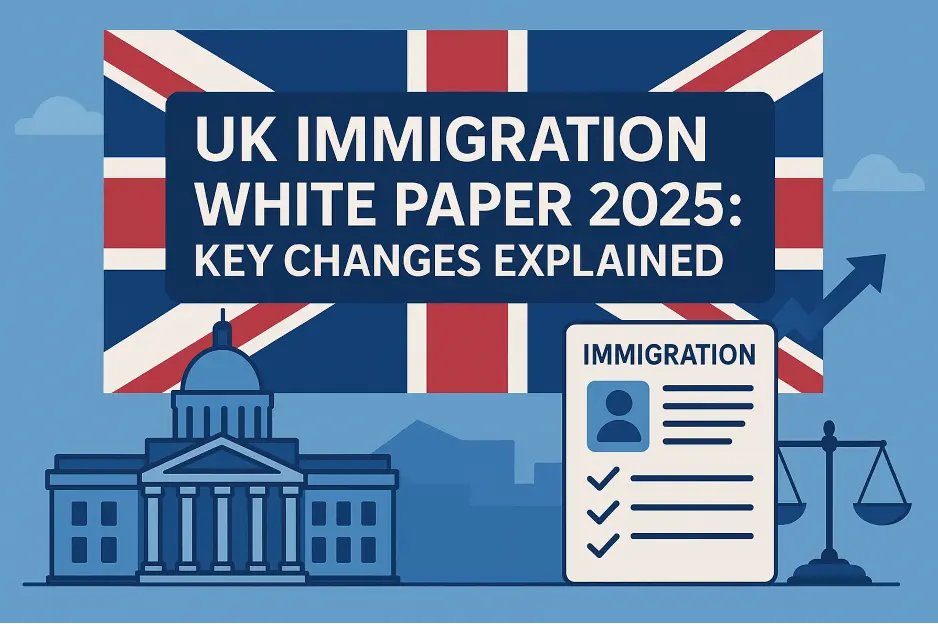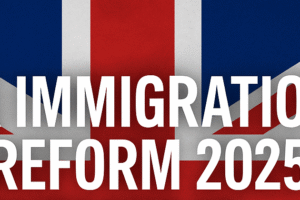
The UK’s 2025 Immigration Overhaul: Implications for International Students
Introduction to the UK’s 2025 Immigration Overhaul
The United Kingdom is poised for a significant transformation in its immigration policies with the proposed overhaul set to take effect in 2025. This reform is primarily motivated by the need to attract highly skilled workers who can contribute to the nation’s economy while balancing public safety and national interests. The UK’s immigration landscape has undergone numerous changes over the years, reflecting shifts in political, economic, and social priorities. By understanding the proposed changes, stakeholders can better prepare for the implications of these new policies on various groups, including international students.
Historically, the UK has maintained a complex immigration system that has evolved in response to changing demographics and economic needs. Over the past few decades, immigration policies have often oscillated between openness and stringent restrictions. The introduction of the Points-Based Immigration System in 2021 marked a significant shift, aiming to create a tiered structure for those seeking entry based on skills and qualifications. With the upcoming overhaul, the government aims to refine this system further to ensure that it not only meets labor market demands but also addresses broader societal concerns regarding immigration control.
The 2025 immigration reform emphasizes the importance of attracting global talent as part of the UK’s response to post-Brexit challenges. By prioritizing skilled influxes, the policy seeks to enhance the competitiveness of the UK in the global market while safeguarding public safety. It aims to reassure citizens that their interests and security remain at the forefront of immigration deliberations. The implications of this overhaul will be significant, particularly for international students who often serve as a vital resource in the academic and labor sectors. As they navigate this evolving landscape, understanding the motivations and context of these policy changes will be crucial for prospective students and educational institutions alike.
Key Changes in the Immigration System
The UK government is set to implement significant changes to its immigration system by 2025, affecting various categories of migrants, including international students. One of the most notable adjustments involves the introduction of a points-based immigration system that will streamline visa applications and their associated criteria. Under this new system, applicants will be awarded points based on qualitative factors such as academic qualifications, language proficiency, and job offers from approved employers.
For international students, the revised regulations will necessitate higher English language proficiency standards, as well as a clear demonstration of financial stability to support living expenses during their stay. These requirements aim to ensure that students are well-prepared for their educational pursuits in the UK, while also mitigating the possibility of financial strain on public resources.
Moreover, the new immigration policy is expected to create more defined pathways to residency for international students who wish to remain in the UK after completing their studies. Currently, international graduates are allowed to stay for two years after their program under the Graduate Route. However, new proposals suggest extending this period, coupled with clearer criteria for transitioning to work visas or permanent residency. This extension would incentivize students to contribute to the UK economy while also providing them with a viable route to establish their future in the country.
In addition to these changes, there will also be a stringent review process for visa applications, aiming to tackle issues such as fraudulent submissions and non-compliance. This new framework is designed to rigorously evaluate applicants while simultaneously fostering a welcoming environment for genuine students. Collectively, these changes reflect the UK’s commitment to attracting global talent while ensuring that the immigration system remains robust and accountable.
Impact on International Students
The UK’s 2025 immigration overhaul is poised to significantly reshape the landscape for international students aspiring to pursue education in the country. One of the primary changes involves stricter entry requirements, which may deter prospective students from applying. As institutions adjust to the new policies, potential candidates may reconsider their academic choices, weighing the implications of the revamped immigration process against their educational goals.
Furthermore, the introduction of enhanced post-study work opportunities is expected to positively influence enrollment among international students. The potential to remain in the UK for work after graduation can make studying in the country more attractive, allowing students to gain relevant experience in a global job market. This aligns with the aspirations of many students who seek not only academic excellence but also a pathway to career advancement after completing their studies.
Financial implications will also play a crucial role in shaping the experiences of international students. Tuition fees, living expenses, and potential changes to scholarship availability are key factors that will influence student decisions. The concern surrounding affordability may lead some students to seek alternatives in other countries with more favorable immigration policies. Therefore, UK institutions must ensure that they remain competitive by offering financial support and attractive packages to draw in international talent.
Additionally, the overall experience of international students could be impacted by these policy changes. With new regulations in place, universities may need to enhance their support services to help students navigate the complexities of visa applications, work permits, and other related matters. Institutions must prioritize creating a welcoming environment that fosters inclusivity and addresses the diverse needs of the international community, thereby enriching the academic experience for all students.
Visa Requirements for International Students
The United Kingdom’s impending 2025 immigration overhaul is set to bring significant changes to the visa application process for international students. Students aspiring to pursue their education in the UK will have to navigate a streamlined yet rigorous visa protocol designed to maintain the integrity of the nation’s immigration system while accommodating a diverse student population. The core eligibility criteria for aspiring international students typically include proof of acceptance into a recognized institution, demonstrating sufficient financial means to support themselves, and the ability to speak English to a specified standard.
Applicants must provide a variety of documentation to support their visa application. This documentation includes an unconditional offer from a UK educational institution, evidence of funds to cover tuition fees and living expenses, and proof of English language proficiency, often evidenced through examinations such as the IELTS. Moreover, students may need to provide a valid passport, biometric information, and, in certain cases, additional records such as academic transcripts. Understanding the nuances of these documentation requirements is essential to successfully navigate the visa application process.
The timeline for the visa application can vary significantly. Generally, students are advised to apply at least three months before their intended start date to allow for necessary processing time. The visa application forms can be completed online, followed by an appointment at a visa application center for biometric submission. Potential costs related to the visa application include the application fee itself and the Immigration Health Surcharge, which grants students access to the NHS while studying in the UK. Additionally, students should be aware that these visa requirements may differ considerably from those applicable to other visa categories, emphasizing the need for thorough research and preparation.
Pathways to Post-Study Work
The recent overhaul of the UK immigration system aims to create more accessible pathways for international students who wish to work in the UK post-graduation. One of the most significant aspects of this reform is the Post-Study Work (PSW) visa, which allows graduates to stay in the UK for up to two years following their studies. This period is essential for international students seeking to gain relevant work experience and establish professional networks in the UK job market.
The PSW visa is particularly relevant for students who have completed a degree at the undergraduate level or higher at an approved UK institution. It provides an opportunity for these individuals to seek employment in their field of study without the immediate concern of needing sponsorship from an employer. This flexibility is crucial, as it enables international graduates to explore a variety of job roles, helping them to enhance their employability in an increasingly competitive global market.
Additionally, changes in regulations may introduce skilled work pathways specifically designed for international students, recognizing their contributions to the UK economy and workforce. Such initiatives might include streamlined application processes or the expansion of occupations eligible for sponsorship by employers. The evolution of these pathways could significantly impact the ability of international graduates to transition from student status to fully employed professionals within the UK.
However, the anticipated overhaul also brings concerns regarding potential restrictions or increased competition for job opportunities. Ensuring a fair chance for international graduates to secure employment will be crucial. Consequently, understanding the implications of these immigration changes and strategically navigating available work pathways can empower international students, enhancing their career prospects in the UK.
Social and Cultural Implications
The UK’s immigration overhaul set for 2025 carries profound social and cultural implications, particularly for international students and the broader UK community. As the new policies unfold, they present both challenges and opportunities in the realm of cultural exchange and diversity. With stricter immigration regulations, there is a potential concern regarding the reduction in the influx of international students. This demographic often plays a crucial role in enriching university campuses through their diverse backgrounds and perspectives.
Cultural exchange is fostered in environments where students from various countries interact, share ideas, and collaborate in academic contexts. The anticipated changes may result in diminished opportunities for these interactions, potentially leading to a more homogenized academic environment. This consequence could stifle the creativity and innovation that arise from diverse viewpoints, highlighting the importance of maintaining robust channels for international student integration and participation.
Furthermore, the social fabric of the UK is deeply interwoven with the contributions of international students. They not only add to the academic landscape but also participate actively in local communities, enriching cultural life through festivals, traditions, and culinary diversity. Should the new immigration policies inadvertently limit their numbers, this loss could diminish the cultural vibrancy that has long characterized British society.
Moreover, the implications extend beyond campus life. The ability of international students to build networks and relationships with local individuals enhances understanding and fosters goodwill between nations. Reduced engagement may hinder international relations, as stronger ties often develop through personal connections forged in educational settings.
In essence, navigating the social and cultural ramifications of the UK’s immigration policies will require a concerted effort to ensure that international students continue to feel welcomed and valued, thereby enhancing the rich tapestry of cultural exchange that benefits both the students and the UK community at large.
Reactions from Educational Institutions
The proposed 2025 immigration overhaul in the UK has elicited a varied response from universities and colleges across the nation. Educational institutions recognize the implications these changes could have on their ability to recruit international students, a crucial component of their overall demographic. Institutions express concern that stricter immigration policies could deter prospective students from choosing the UK for their higher education. Many believe that the country has traditionally been an attractive destination for international students, primarily due to its diversity and exemplary academic offerings.
Several universities have articulated their concerns regarding their capacity to maintain the current level of academic excellence and international reputation if the proposed reforms restrict student numbers. Institutions fear that decreased enrollment from abroad may lead to financial instability, as international students contribute significantly to tuition revenues. Furthermore, colleges emphasize that a diverse student body enriches the educational experience for all, promoting a cross-cultural understanding that is crucial in today’s globalized world.
In response to the impending policy changes, many universities are taking proactive measures. Some are ramping up their recruitment strategies to engage with international students at earlier stages, ensuring that their offerings are communicated effectively. Additionally, consultations are being held with governmental bodies and stakeholders in the education sector to advocate for policies that would retain the UK’s competitive edge in attracting international talent.
Moreover, educational institutions are exploring partnerships with organizations abroad as a means to sustain their international student numbers. These partnerships could provide valuable pathways for students to access UK education without the complications that may arise from the new immigration regulations. Overall, while educational institutions express apprehension about the 2025 immigration changes, they remain committed to adapting their strategies to uphold the quality and accessibility of education in the UK.
Advice for Prospective International Students
As prospective international students evaluate the opportunity to study in the UK following the 2025 immigration overhaul, it becomes imperative to navigate the new landscape with informed strategies. Understanding the emerging immigration system will be crucial for international students aiming to secure their place in UK institutions. The first step is to familiarize oneself with the updated application processes, which may differ significantly from previous regulations. Students should regularly consult official UK government resources and university websites to stay informed about any changes that might affect their applications.
Furthermore, it is essential to prepare adequately for life in the UK, beyond the academic journey. This includes understanding the cultural nuances and local customs, which can aid in smoother integration into the educational environment. Engaging with current international students through forums or university social media groups may provide invaluable insights into daily life and practical tips for adjusting to a new country.
Financial planning will also play a pivotal role in the experience of international students. Understanding tuition fees, living expenses, and potential sources of funding is vital. Institutions often offer scholarships or financial aid, thus reaching out directly to the financial aid offices of prospective universities can unveil opportunities for support. Students should meticulously assess their budgets, factoring in accommodation, transportation, and other living costs to ensure a feasible financial plan.
Moreover, international students should explore the support resources provided by universities, including counseling services, academic support, and community engagement programs. These resources are designed to enhance the student experience and can significantly alleviate the challenges encountered during the transition period. By taking these proactive steps, prospective students can position themselves for a successful academic and cultural experience in the UK post-2025.
Conclusion: Future of UK Immigration Policy
The UK’s immigration policy, particularly in relation to international students, is currently undergoing a significant transformation with the impending 2025 overhaul. This change is poised to redefine the landscape for prospective international students, imposing new requirements and opportunities for those seeking education in the UK. As the government seeks to streamline the immigration process, the implications for international students are profound and multifaceted.
One key aspect to consider is the increased focus on skill-based immigration that prioritizes qualifications and professional expertise. This trend may benefit international students who possess the necessary skills that the UK labor market demands. However, it could also inadvertently create barriers for students from certain backgrounds who may not easily navigate the new system, thus broadening the inequality gap within educational opportunities. Consequently, universities and educational institutions must adapt their recruitment strategies, ensuring they remain attractive for students from diverse socio-economic backgrounds.
Additionally, the nuances of student visas and post-study work rights are expected to evolve. Enhanced opportunities for work post-graduation could serve as a significant incentive, allowing international students to gain practical experience in the UK before returning home. These policy directions will undoubtedly shape perceptions of the UK as a destination for higher education, potentially impacting enrollment figures in the coming years.
As we look beyond 2025, it is essential to anticipate ongoing adjustments to the immigration framework in response to both global events and domestic needs. Continuous reviews of immigration policies are vital in ensuring that they align with the aspirations of international students while addressing the UK’s labor market demands. Thus, engaging with stakeholders from the educational sector to ensure a balanced approach will be crucial in navigating this evolving immigration landscape.



 RAQ Education London
RAQ Education London